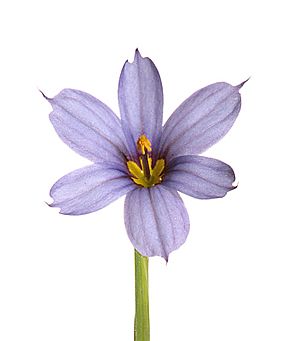Narrow-leaf blue-eyed-grass facts for kids
Quick facts for kids Narrow-leaf blue-eyed-grass |
|
|---|---|
 |
|
| Scientific classification |
|
| Kingdom: | Plantae |
| Clade: | Tracheophytes |
| Clade: | Angiosperms |
| Clade: | Monocots |
| Order: | Asparagales |
| Family: | Iridaceae |
| Genus: | Sisyrinchium |
| Species: |
S. angustifolium
|
| Binomial name | |
| Sisyrinchium angustifolium Mill.
|
|
| Script error: The function "autoWithCaption" does not exist. | |
| Synonyms | |
|
List
|
|
Script error: No such module "Check for conflicting parameters".
Sisyrinchium angustifolium, often called narrow-leaf blue-eyed-grass, is a lovely wild plant. It's a type of herb that grows back every year. It spreads using underground stems called rhizomes. You can often find it in wet meadows and open woodland areas.
This plant is the most common kind of blue-eyed grass found in the eastern United States. People also grow it in gardens because it's so pretty.
Contents
About the Narrow-Leaf Blue-Eyed Grass
This plant is known for its beautiful blue flowers. It's a perennial, which means it lives for more than two years. Each year, it grows new shoots from its roots.
Where It Grows
The narrow-leaf blue-eyed-grass is found across a wide area. It grows in eastern Canada and the United States. Its range goes west to Texas and Minnesota. You can spot it in meadows, low woodlands, and along shorelines.
What It Looks Like
The narrow-leaf blue-eyed-grass has some unique features:
- Height: It usually grows to be about 15 to 50 centimeters (6 to 20 inches) tall.
- Stem: The stem is flat and wide, like it has "wings." It's about 2 to 4 millimeters (about 1/16 to 1/8 inch) wide. The stem often has branches.
- Leaves: Its leaves are narrow, about 2 to 6 millimeters (about 1/16 to 1/4 inch) wide.
- Flowers: The flowers have 6 Tepals, which are like petals. They are bright blue and about 7 to 10 millimeters (about 1/4 to 3/8 inch) long. Each tepal has a sharp point at its tip. You can see veins on them, and they get darker toward a yellow patch in the center.
Gallery
Images for kids
 | Kyle Baker |
 | Joseph Yoakum |
 | Laura Wheeler Waring |
 | Henry Ossawa Tanner |






